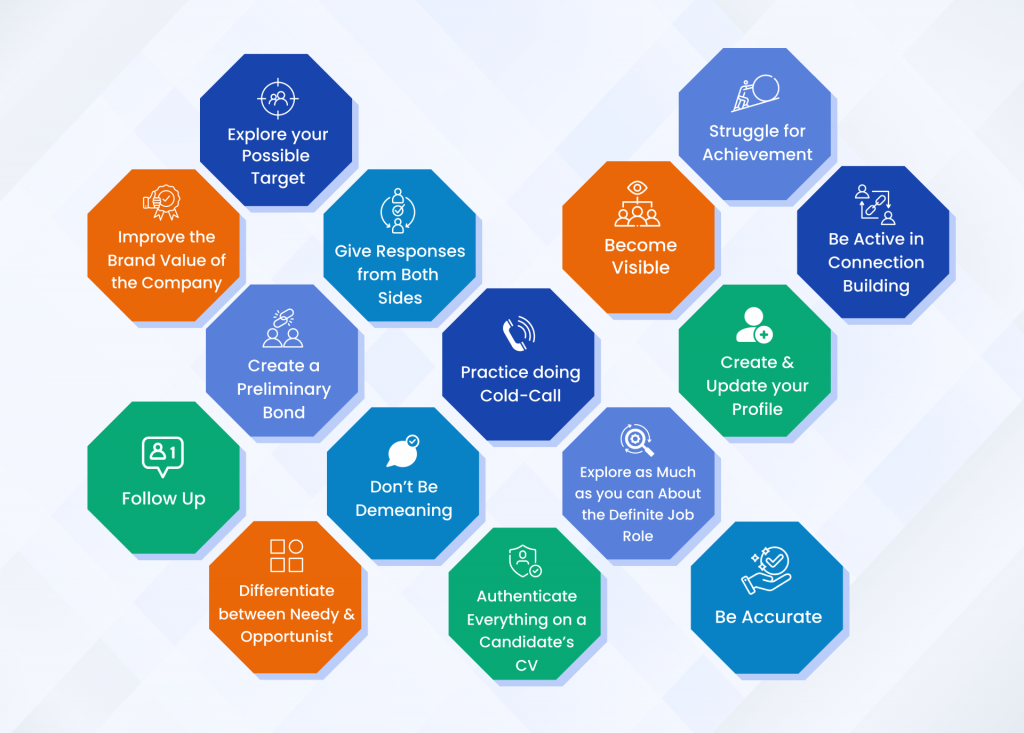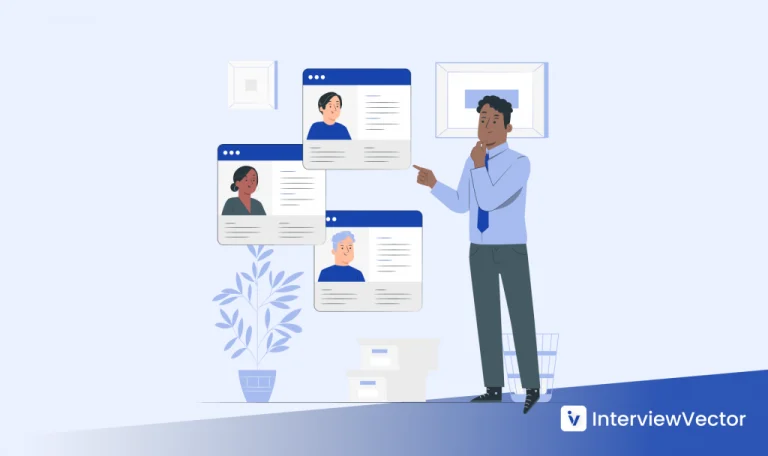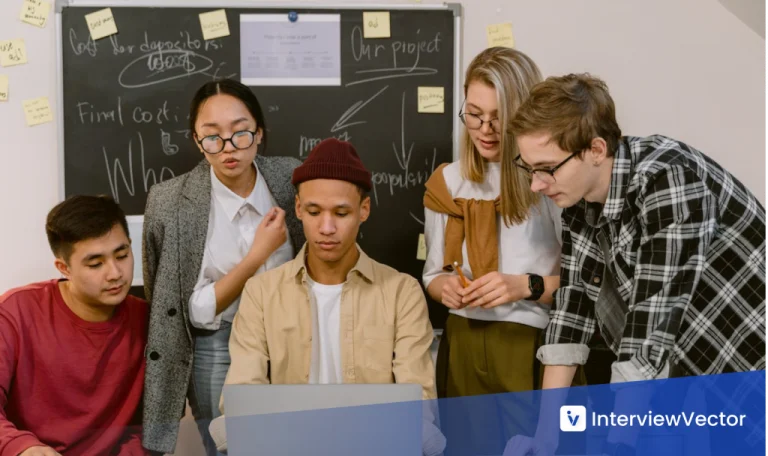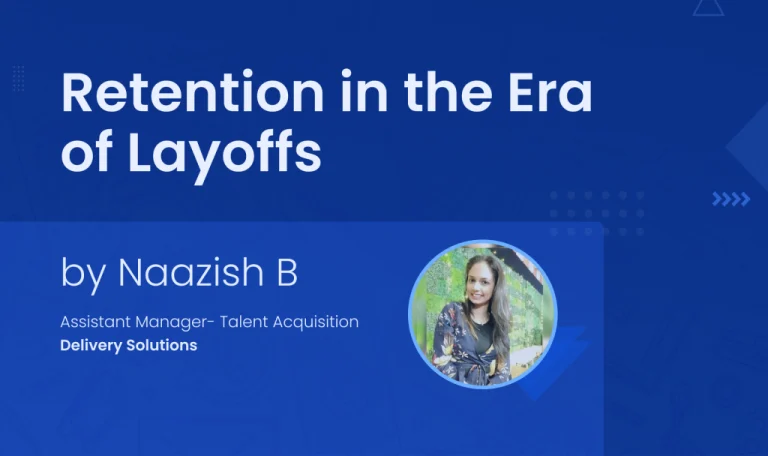Introduction
Interviews are uncompromising experiences for companies and applicants, whereas executinginterviewing best practices can take the pressure out of the procedure and advance your recruitment success rate. Before planning interview questions, managers should be clear about the position they are recruiting for while formulating thoughtful questions. Interviews are debatably the most vital step of the acquisition process. You have to elucidate your attention and your expectations. Structure your interview questionsfor the best interviewing experience. It is worse for an applicant than to walk into an interview with no proper setup and an unpredictable line of questioning. Read the blog to understand more aboutthe best practices for the interview process!
What is a Job Interview?
A job interview is a discussion between an interview candidate and a company representative. Generally, a recruiter or a member of the HR department conducts interviews. Its objective is for the company to evaluate the candidate’s competencies, qualifications, experience, and cultural fit for the position they’re applying for.
• During interviewing best practices for hiring managers, the employer typically asks interview questions to learn more about the applicant’s background, work history, activities, and how they would manage diverse situations related to the job.
• At the same time, the applicant can ask questions about the organization, the role, and the workplace to control if it streamlines with their career goals and objectives.
• Job interviews can take numerous forms. Different forms of interviews to conduct interviews are in-person interviews, group interviews, or video interviews carried out over video conferencing portals.
• The set-up and structure of the interview questions can differ depending on the organization’s practices. Also, the candidate must align with the responsibilities mentioned in the Job description.
Interviewing Best Practices: 15 Strategies for Headhunters

1. Explore your possible target:
Headhunting is one of the most significant duties of a freelance hiring manager or recruiter. Outlooks of this technique are high, so you are required to be able to provide a list of excellent candidates to the employer. Hiring managers are further needed to recognize specialists who are not just good at what they do. The hiring managers need to be excellent. You can discuss this in your network to increase the hiring rate and Interviewing Best Practices.
2. Improve the brand value of the company:
Candidates are much more eager to change jobs while visiting an organization that is well known. To gain trust, you need to improve the company’s brand value so that when you reach them, they’ve already heard of you and will be more eager to listen to your pitch.
3. Create a Preliminary Bond:
From the candidate’s viewpoint, headhunting is difficult. If not done instantaneously, it is of no use. You must agree that having somebody approach you with an ‘excellent’ job opportunity sounds scammy, so consider a more practical approach. Initiate by introducing yourself and the organization. It will create interest from the person you are focusing on and make them more optimistic and open to your pitch.
4. Follow Up:
The most common issue faced by headhunting is getting rejected by the candidate. Most people prefer to stay out of a job before accepting new responsibilities. When a candidate denies an offer or doesn’t turn up for an interview, ensure that you take the time to express your feedback and ask for consent to contact them when another opportunity arises.
5. Differentiate between Needy and Opportunist:
While approaching different candidates, the hiring manager is the one who needs to motivate his candidate regarding job opportunities. A recruiter will always push a candidate when he wants to onboard one for the job. The hiring manager needs to adopt different strategies to motivate and encourage employees. You are required to be balanced. Never show any candidate that you are in dire need. The candidate will assume that the job includes pressure.
6. Explore as Much as You Can About the Definite Job Role:
Hiring managers should ensure that recruiters are well-versed in the job role. . It is necessary to understand the job description. One should initiate headhunting for the right candidate. Always consult with the department head and select candidates fit for job opportunities. Headhunting is a long process but is an investment for the future.
7. Don’t Be Demeaning:
Generally, headhunters are inclined to be very demeaning to candidates. Although this is usually true only for lower-ranking specialists, that does not mean you know what the candidate should do. Be eager about the prospect, but leave space for the professional to process the offer. They won’t work in your favor to ensure that you listen to what the candidate has to say and provide help to overcome any difficulties.
8. Give Responses from Both Sides:
It’s significant to keep the communication lines open with both parties throughout the hiring procedure. If you have tremendously high prospects, it’s your job to manage them. You must provide your client with detailed information about the candidate. You must assist them in dealing with the problems that matter.
9. Practice doing Cold-Call:
You’ll find that most people will be involved in what you say and how it can benefit them. Receiving the phone and cold-calling is mostly a good plan. To make the most of its impact, I’d recommend you create a relationship with each expert before you cold-call them. Linking on LinkedIn is always a great place to initiate and ensure smooth Interviewing Best Practices.
10. Authenticate Everything on a Candidate’s CV:
An additional excessive headhunting tip that can save you a lot of headaches with the client is safeguarding that everything on a candidate’s CV is accurate. Though not everybody, many people will provide false information about their employment period on their CV. It is essential to check your background before hiring.
11. Become visible:
Hiring Managers should consider candidates to pursue them out for an opening. You can become more noticeable by events related to your field, such as meetings, discussions, and lunch conferences. At these assemblies, it may assist to be communal and make your existence known to other experts.
12. Create and update your profile:
Many recruiters use social media portals to understand potential candidates. Making your profile noticeable and displaying your career, knowledge, and accomplishments may be a vigorous part of being headhunted.
13. Struggle for achievement:
Hiring Managers need to be rational about the candidates they employ are the best in their field. The candidates they talk to are generally ones who have recognized themselves and are now doing well in their jobs. Making a series of advancements, attaining professional awards, and publishing articles are all events of success that can grow your need for headhunters.
14. Be active in connection building:
Having an online profile and presence may be part of connecting, but you can also connect in person. You can initiate by building relationships with the colleagues you see every day. It creates new business associates by going to work-related measures or connecting networking groups.
15. Be accurate:
As somebody already in authority, you may have an understanding of your value. Knowing this and having realistic expectations as you enter the job market can assist you in choosing the most appropriate position and adopting Interviewing Best Practices.
What do you mean by Interviewing Candidates?
Interviewing candidates means gauging and calculating individuals who have applied for a job within an organization. It includes carrying out planned discussions or meetings with candidates to regulate their experience, qualifications, competencies, and fitness for the position they are applying for.
- When a company is interviewing best practices for hiring managers, they characteristically have definite standards and necessities in mind that they are searching for in probable employees.
- The hiring manager will ask interview questions to discover more about the applicant. The essentials include achievements, background, work history, and how their competencies and experience streamline with the job requirements.
- Interviewing applicants is a vital step in the recruitment procedure. It permits hiring managers to collect information about each candidate and make interview techniques best fit for the role and the company.
- It provides an opportunity to discover more about the organization and the position and validate why they are well-matched for the job.
Types of Job Interview Techniques
- Planned Interviews: The hiring managers follow a fixed set of interview questions asked of all applicants. It offers reliability and permits for convenient assessment of applicants.
- Un-planned Interviews: In comparison to interviewing best practice 2024, un-planned interviews are more informal and may not adopt definite interview questions. They permit more elasticity and can assist in disclosing the character and communication skills of the applicant.
- Interactive Interviews: Interactive interviews emphasize past behavior as a pointer to the candidate’s experience. Applicants offer interview best practices. These interviewing best practices include how they manage certain circumstances in earlier jobs, showcasing their skills and capabilities.
- Case Interviews: Generally used in fields such as access, case interviews present applicants with theoretical business problems or situations and ask them to examine the situation and suggest solutions. These interviewing best practices 2024 evaluate investigative thinking, problem-solving skills, and the capacity to think on one’s feet.
- Panel Interviews: In panel interviews, applicants are asked interview questions by a group of hiring managers, characteristically entailing representatives from diverse departments or levels within the company. These interview techniques for numerous viewpoints may accelerate the decision-making procedure.
- Procedural Interviews: Procedural interviews evaluate an applicant’s ability in definite procedural skills appropriate to the job. It could comprise encrypting tests for software engineering responsibilities, project exercises for inventive positions, or other procedural evaluations.
- Telephonic or Virtual Interviews: These interview techniques are used remotely over the phone or through video conferencing portals. They are frequently used as primary screening interviews to evaluate basic qualifications and examine if candidates should ask for in-person interviews.
- Strain Interviews: Strain interviews deliberately create pressure or stress for applicants to see how they answer under stimulating situations. They may include one-on-one questioning, argumentative behavior from the interviewer, or other strategies to device the applicant’s serenity and flexibility.
- Group Interviews: In group interviews, numerous applicants are questioned concurrently, frequently in a group conversation or activity. Companies use this format to detect how applicants cooperate with others, transfer their ideas, and validate leadership or teamwork skills.
Companies may select one or a mixture of these interview techniques contingent on the nature of the job, the organization’s culture, and the definite qualities they are looking for in applicants. Each technique has benefits and confines in evaluating diverse aspects of an applicant’s appropriateness for a position.
What are the Different Methods of Interviews?
The different methods of interviews refer to the numerous formats or approaches by which interviews happen. Here are various modes of interview:
- Personal Interviews: Personal interviews are interviews where the applicant faces the interviewer in person. Interviews happen at a precise location, such as the organization’s office.
- Telephonic Interviews: Telephonic interview means Where the recruiter and applicant converse over the phone. They are not present physically at the interview location. Telephonic interviews are frequently used for preliminary screening or as the easiest way to conduct interviews when personal meetings are not practicable.
- Virtual Interviews: Virtual interviews permit personal interaction without physical immediacy, making them chiefly beneficial for remote or long-distance interviews.
- Group Interviews: Interviews where numerous applicants are interviewed instantaneously, frequently in a group conversation or activity. Group interviews permit businesses to observe how applicants interact with each other, express their ideas, and validate teamwork skills.
- Consecutive Interviews: Successive/Consecutive interviews include numerous interviews with diverse hiring managers or panels. Each round may emphasize diverse aspects of the applicant’s qualifications or include diverse stakeholders within the company.
- VR Interviews: Developing technology permits virtual reality interviews, where applicants interact with creatures representing interviewers or involved in simulated job-related tasks. Virtual Reality interviews offer an immersive experience and can be chiefly beneficial for evaluating applicants’ soft skills and behavioral replies.
What are the Benefits of Interviewing Candidates?
- Evaluation of Experiences: Interview techniques provide an opportunity to evaluate candidates’ qualifications, competencies, and understanding firsthand. Through interviewing best practices for managers, hiring managers can assess if applicants possess the essential knowledge and proficiency for the job.
- Assessment of Fit: Interviewing best practices for hiring managers lets recruiters evaluate candidates’ cultural fitness and capacity of applicants. Some pointers to assess are the company’s values, assignments, and workplace. It comprises evaluating interpersonal skills, communication skills, and streamlining with business culture.
- Interactive Insight: Interactive interviews permit companies to gain awareness about applicants’ past conduct and performance, which can reveal future success. By questioning applicants to provide definite examples of how they managed situations in earlier roles, recruiters can evaluate their problem-solving capabilities, decision-making skills, and flexibility.
- Validation of Information: Interviews offer the chance to authorize and explain the information provided in resumes or application materials. Assessors can investigate deeper into applicants’ backgrounds, achievements, and qualifications, authenticating the correctness and significance of their claims.
- Appointment and Communication: Interviews enable direct appointment and communication between applicants and assessors, permitting both parties to ask interview questions, exchange information, and evaluate mutual interest. This personal communication can assist applicants form an optimistic impression of the organization and its representatives.
- Elevation of Employer Brand: Well-conducted interviews can enhance the employer brand and reputation of the organization. Positive interview experiences leave candidates with a favorable impression of the company.
- Decision Making: Interviews play a vital role in the decision-making procedure by offering valuable data and visions that help in Implementing Best Practices for Successful Interviews. Interview feedback from numerous stakeholders permits recruiting teams to assess applicants broadly and choose the most capable individual for the job.
- Chance for Explanation: Implementing Best Practices for Successful Interviews offers applicants an opportunity to ask interview questions and pursue clarification about the role, tasks, business culture, and other appropriate aspects of the job. This two-way communication nurtures clearly and assists applicants with well-versed decisions about their appropriateness for the position.
Generally, interviewing applicants through interview techniques is a crucial step in the recruitment process that permits companies to make informed decisions, appraise applicants thoroughly, and eventually Implementing Best Practices for Successful Interviews for the organization.
What are Some Common Interview Questions?
Interview questions can differ depending on the role, industry, and business culture, but here are some examples of interview questions asked in job interviews:
- Tell me something about yourself or introduce yourself
- What are your positives and weaknesses?
- Why are you interested in this post/business?
- Can you brief me about your resume?
- Explain a challenge you faced in a preceding role and how you handled it.
- Are you aware of our company?
- What is your professional achievement?
- How do you manage conflicting situations in the organization?
- Explain a time when you exercised leadership skills.
- How do you manage your tasks and time efficiently?
- What are your salary prospects?
- Do you have any questions to ask?
These interview questions cover different topics. It includes the applicant’s background, competencies, experience, problem-solving abilities, and fitness for the role and organization. Interviewers may also request interactive questions to evaluate how candidates have managed definite circumstances in the past. Situational questions allow to assess how they would approach hypothetical situations related to the job. Applicants need to create responses to these interview questions in advance and illustrate examples from their expert experience to validate their qualifications and appropriateness for the position. These questions serve as guidelines for the interviewer to question candidates with a fixed set of questions.
Understanding the Importance of Effective Interviewing
Effective best practices for interviewing candidates are vital for a variety of reasons:
- Firstly, it guarantees that you’re hiring the right talent for your company. A planned interview evaluates the applicant’s skills, experience, and cultural fit, streamlining them with the company’s objectives and morals.
- Secondly, it improves the applicant experience. Strategies for effective interviewing provide applicants with insights into your establishment’s culture, values, and work environment. An optimistic interview experience, irrespective of the outcome, leaves candidates with a satisfactory imprint of your company, which can influence your employer’s reputation.
- Furthermore, effective interview process best practices reduce partialities. Using planned interviewing best practices, concentrating on job-related standards, and training interviewers to identify and alleviate partialities. You can make reasonable and impartial recruitment decisions.
- Moreover, best practices for interviewing candidates assist in recognizing candidates’ growth and development. Consider questioning and evaluating candidates’ past experiences and performances. You can devise their capability to learn, adjust, and donate to the company’s enduring victory.
- Interview best practices for hiring managers contribute to overall organizational victory. By choosing the right employees having the skills, knowledge, and attitude essential for the role, you’re building a solid team that can drive invention, efficiency, and viability.
In essence, interviewing best practices is not just about hiring the right candidate; it’s about identifying the best candidate for your company and nurturing a positive candidate experience while diminishing partialities and increasing the potential for success.
What are the Best Strategies for Conducting Interviews?
Carrying out effective interviewing best practices needs cautious development, clear discussion, and use strategies for effective interviewing to collect appropriate information and assess candidates accurately. Here are some approaches to guarantee your interviews are successful:
- Prepare clear Job Description: Start by clearly describing the job requirements, including the experience, skills, and qualifications essential for success in the role. It will serve as a set of rules for creating interview questions and assessing applicants.
- Use Planned Interviews: Plan your interviews by framing standardized questions based on the job needs. It guarantees reliability and impartiality in the assessment process, permitting you to compare applicants accurately.
- Enquire Open-Ended Questions: Use open-ended questions to encourage applicants to offer complete replies and share examples from their experiences. It assists you to gain visions into their knowledge, skills, and problem-solving capabilities.
- Use Behavioral Interviewing Methods: Use behavioral interview process best practices techniques to evaluate candidates’ past behavior and performance. Ask applicants to offer definite examples of how they have faced challenges, accomplished goals, or demonstrated key capabilities appropriate to the role.
- Listen Properly: Practice listening during the interview to completely understand applicants’ replies and follow up with possible questions when essential.
- Manage Interview Efficiently: Manage the interview time efficiently to cover all appropriate topics and queries while permitting suitable discussion and communication. Set a plan and stick to it to guarantee detailed and best practices for interviewing candidates.
- Evaluate Cultural Fitness: Evaluate applicants for cultural fitment by enquiring questions about their morals, work style, and chosen work environment. Study how well they comply with the company culture and morals to ensure they will be the right candidate for the team.
- Follow-Up: Follow up with applicants after the interview to give a response, answer any additional queries they may have, and keep them well-versed about the next steps in the recruitment process. Maintaining relations assists in creating understanding and keeps applicants promised.
How Should you Prepare for an Interview?
- Carry out appropriate research: It is vital to carry out research for having a planned interview preparation. Search the applicant you are questioning, the organization they work for, and the subjects you will be conversing with in the interview while conducting interviewing best practices. It will assist you in asking appropriate questions, creating a solid reputation with the interviewee, and displaying how attentive and devoted you are in the interview while hiring the best-qualified candidates.
- Formulate questions: Formulate a list of open-ended queries. It will assist and inspire the interviewee to share their views, sentiments, and experiences easily. Strategies for effective interviewing are more rational and lucid to create an organic flow to the discussion. It will increase the quality of recruitment and choosing the talented candidates.
- Examine your line of questioning: Make sure you share your queries with your hiring team or an HR professional to get a response. It will assist in filtering your interview best practices for employers to guarantee that they are firm and easy to execute.
- For virtual interviews: Examine your technology like microphone, camera, and internet beforehand. It is essential to see if they are functioning appropriately. Make sure to select a quiet and proper light in the background for the interview and that the background is formal and free from interruptions. Guarantee that you have a better connection, connect well online, and pay attention to what the interviewee is discussing. It will guarantee a variety of valuable employees for your organization.
How Should you Conduct the Interview?
- Build a solid understanding: Always initiate your interview by introducing yourself and creating a relaxed environment for the applicant. Let the interviewee share their opinions and practices. You should provide hiring managers enough time to express themselves and not disturb them in their flow of communication. The interest of a skilled candidate needs to be protected. It is vital to build a solid understanding.
- Clarify the interview procedure: Make sure to advise the applicant about what they can assume during the interview procedure. It comprises the presentation, the number of people interviewing, information about the examiners, and the expected interview duration. Do notify them of any job-related tests or evaluations required. Doing so will retain the interview and set clear aims and expectations for the candidate and you. It will guarantee a well-planned interview and the choice of a valuable candidate.
- Vigorous listening: Take notes if essential, and listen responsively to the interviewee’s replies. Do not disturb and ask follow-up queries to elucidate any points you fear to answer after they converse. Vigorous listening is very critical as it assists you in recognizing the interviewee’s viewpoint. You can improve a deeper insight into their practices and opinions. Vigorous listening is significant for elucidating vague information, classifying key themes and thoughts that appear during the interview, etc. It also demonstrates the respect for the candidate’s time and skills. Create your vigorous listening skills to guarantee the selection of the right applicant and quality recruitment.
- Elasticity: Be ready to adopt changes in planned interviewing best practices. If the applicant is talking about specific topics that seem appreciated or chiefly fascinating, ask them to elaborate on the required topics. Furthermore, to carry out best interview practices for employers, if the discussion goes off-topic, guarantee that you courteously direct the conversation back to the main question. Always ensure the structure of the interview is safe.
How Can You Monitor and Track Interviewing Best Practices?
Reviewing and tracking interview quality is essential to guarantee that you are recruiting the best candidates and making the most of your employment efforts. Here are some practices to monitor and track interviews:
- Create an interview record: An interview record is a tool used to evaluate the excellence of conducting the interview. It comprises a list of skills significant for the job and a rating scale that permits the hiring managers to rate the interviewee’s performance in each category. An interview scorecard tracks the quality of the strategies for effective interviewing over time. It also helps recognize the areas for improvement. It can significantly assist the quality of recruitment and guarantee a good-quality interview.
- Screen interview performance: It is vital to screen the interviewer’s performance to ensure best practices for interviewing candidates. You can achieve this by using various approaches. Witnessing interviews and examining interview notes and responses helps improve the interviewers’ scores on the interview scorecard. Post this, companies can deliver feedback and training to assist the interviewers in their skills.
- Get feedback from applicants: Getting applicant feedback on the quality of interviews can be an additional technique. Establishments can get feedback through reviews or the recording of interviews after the accomplishment of the interviewing best practices. This feedback can offer treasured insights into the interview procedure and categorize areas for future development.
- Examine and track recruitment outcomes: An additional way to trail interview quality is to examine the recruitment outcomes. By trailing the performance of the recruited candidates, establishments can evaluate the efficiency of the interview procedure. Always maintain records such as retention rates, performance metrics, and other appropriate gages.
Conclusion:
In conclusion, interviewing best practices is vital for hiring top talent, making well-versed recruitment decisions, and guaranteeing a positive applicant experience. By implementing the best strategies for effective interviewing throughout the recruitment procedure, recruiters can increase their probability of categorizing the candidates for the role while sustaining justice, reliability, and expertise. The best practices include describing the job description clearly, scheduling and formulating interviews, and communicating clearly with applicants. It makes a positive candidate experience, using reliable assessment criteria, asking open-ended queries, listening actively, searching for details, evaluating cultural fit, maintaining records, providing feedback, and following up punctually. By incorporating these strategies for effective interviewing into their interview processes, recruiters can recover the quality of their acquisition decisions, reinforce their employer rapport, and eventually create high-performing teams that drive administrative success.



















